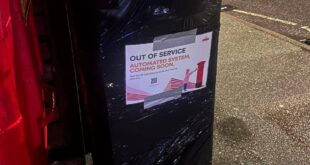HMRC has issued a warning after reports that new scams have been launched in the lead-up to Christmas.
A number of reports have been raised on social media about con artists trying to rip others off in dodgy scams.
And they follow concerns about fake Royal Mail scams and other online frauds aimed at taking your cash.
One woman in Bristol even said her life had been ‘completely ruined’ after con artists claimed to be from Lloyds Bank and stole money from her bank account.
Phishing scams that see thieves pretend to be from genuine organisations to get your bank and other details are just one of the methods being reported, the Express reports
And it is HMRC itself – the Government body that deals with tax collection – that some fraudsters are pretending to represent.
One person told HMRC they received an automated call warning they would face legal action.
Another said they had received a silent call from a number similar to that used by HMRC.
Now HMRC is warning people to watch out as rip-off artists try to steal your money in the lead-up to Christmas.
There are a few key signs that should raise concerns – so watch out.
HMRC say messages are likely to be fraudulent if they:
- are unexpected
- offer a refund, tax rebate or grant
- ask for personal information like bank details
- are threatening
- tell the victim to transfer money
On social media, one worker reported a worrying development that led HMRC’s official support service to urge them to forward the case onwards.
Twitter user @rossowilliams asked: “@HMRCcustomers where should someone report a blatantly false email attempt to masquerade as HMRC?”
In its response, HMRC Customer Support told him: “Hi Ross, this is a phishing scam.
“We don’t send any texts or emails regarding tax refunds.
“You can forward them to the following address: phishing@hmrc.gov.uk.”
Scam issues of this kind appear to be on the rise, as other messages indicate.
User @clairywoowoo shared the following: “B* hell, the scammers are busy today. 02093543674 just called me with a silent call. I understand that 0209 calls often tend to be HMRC scams. Honestly.”
A similar sentiment was shared by @Will_Robins who had the following to say: “Whoa! Just got a call from an automated voice telling me that legal proceedings have been issued against me by HMRC for tax evasion.
“So my number has leaked (not that hard I’ve had it for ages and has been entered on many sites, it’s on my business card), & B very brazen/lazy.”
The scam problems have arrived just as HMRC warned they would.
The agency previously issued a warning that scammers would emerge as tax return deadlines approach.
On November 17, HMRC said that as it issued thousands of text messages and emails as part of its annual self-assessment tax return campaign, scammers would jump in to try to take advantage.
It said within the last 12 months alone, HMRC had responsed to more than 846,000 referrals of suspicious HMRC contact from the public, and reported more than 15,500 malicious web pages to internet service providers to be taken down.
Around 500,000 of the referrals from the public involved bogus tax rebates.
HMRC said in its warning: “Many scams target customers to inform them of a fake ‘tax rebate’ or ‘tax refund’ they are due.
“The imposters use language intended to convince them to hand over personal information, including bank details, in order to claim the ‘refund’.
“Criminals will use this information to access customers’ bank accounts, trick them into paying fictitious tax bills, or sell on their personal information to other criminals.”
Karl Khan, HMRC’s Interim Director General for Customer Services, said: “We know that criminals take advantage of the self-assessment deadline to panic customers into sharing their personal or financial details and even paying bogus ‘tax due’.
“If someone calls, emails or texts claiming to be from HMRC, offering financial help or asking for money, it might be a scam.
“Please take a moment to think before parting with any private information or money.”
Other organisations are also warning people to be wary in the lead-up to Christmas.
Lloyds Banking Group issued a warning after a 21-year-old woman from Bristol said scammers maxed out her credit card and blocked her from regaining access.
It all started with a convincing-looking email that asked for £2 for a package, Bristol Live reports.
Elsewhere, Wiltshire Police told the Wiltshire Times that people needed to keep their eyes peeled.
Police and Crime Commissioner, Angus Macpherson said: “Many people will be turning to the internet to plan for the festivities ahead, but it’s important to remember the basics, don’t get caught out by scammers aiming to benefit from the extra time we’re spending online.
“Having regular conversations with less fraud aware, often older people, could easily help prevent someone you know becoming a victim of these fraudsters. Prevention is always our preferred strategy – let’s all do our bit to try and curtail these scams.”
It comes after reports of a fake Royal Mail scam.
The Accrington Observer reported that a large number of emails had been sent across the UK claiming to be from Royal Mail.
The bogus emails claim Royal Mail has attempted to deliver an item unsuccessfully.
The scam sees people asked to pay a small sum – but doing so could lead to a huge rip-off.



